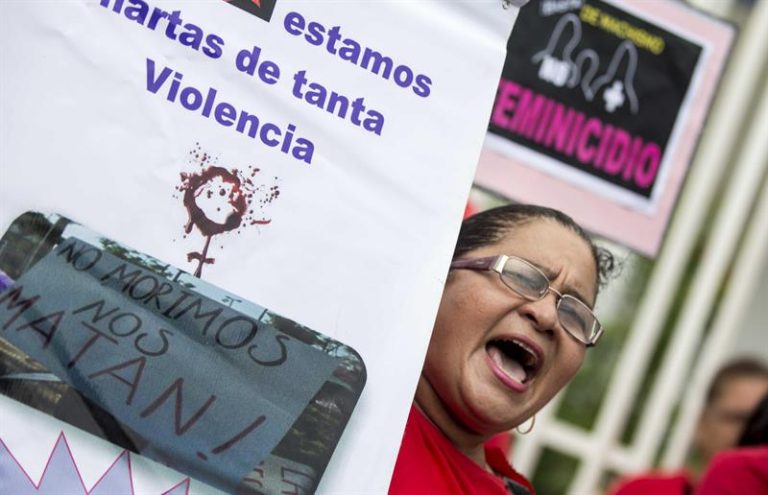20 de noviembre 2020

Children of Exile: The Births “Sowing Hope” in the Camp of Nicaraguan Farmers

PUBLICIDAD 1M
PUBLICIDAD 4D
PUBLICIDAD 5D
The majority of the victims were from rural areas. Thirty-eight of them were wives, girlfriends, former girlfriends or family members.

A total of 69 Nicaraguan women and girls have died in 2020 for reasons of gender. This was the report from the organization “Catholics for the right to Decide”, issued on November 14th.
The International Day that calls for the Elimination of Violence against Women is November 25. However the escalating problem is an every day affair.
Forty-eight women, representing 70% of the victims, lived in rural areas. The departments reporting the highest totals are: The North Caribbean Autonomous Region (14), Managua (12), Matagalpa (9), and the South Caribbean Autonomous Region (5). Six Nicaraguan women were killed in Costa Rica this year. Their murders have remained unpunished.
Martha Flores of “Catholics for the Right to Decide”, attributes the increase in rural femicides to the lack of institutional protection. There’s a general lack of security throughout Nicaragua, but it’s greater in the rural areas.
The majority of the victims – 31 women – were between 19 and 35 years old. Twenty-two of the victims were between 36 and 59 years old, and seven were under 18. According to the report, more than half the victims were spouses, girlfriends, former spouses or family members.
So far in 2020, cases peaked in the months of May, August and September. This has been the most violent year since 2014 for crimes against women and children. In the first nine months of 2020, the total number of femicides already matched the full yearly toll from 2019.
Additionally, the COVID-19 pandemic exacerbated existing gender and sexual violence and sex abuse. The confinement caused by the pandemic forced victims to spend more time in private spaces with their abusers. According to statistics from Nicaragua’s National Police, 76% of violent crimes against women were committed in the victims’ homes.
Only 35 of the cases in Nicaragua went through the justice system. To Martha Flores, the lack of justice has fed the increase in femicides. This is especially true within the current context of the country’s overall socio-political crisis. There’s been increased impunity for all kind of crimes, including those perpetrated by the state and paramilitary forces. These paramilitary forces have continued operating in conjunction with the national police since April 2018.
“Access to justice for cases of gender violence has ceased to exist. There’s no trust in the system, ever since rapists and perpetrators of femicide were benefited with clemency. This tells us that we have a government that’s an accomplice to the violence,” Flores points out. She’s referring to a government decree that freed of hundreds of common prisoners this year. Among those freed were several who were found guilty of femicide, and were only beginning to serve their sentence.
On September 15th, President Daniel Ortega announced new initiatives to allow the possibility of life imprisonment in the country. This punishment, he stated, would be instituted for “hate crimes”. The immediate trigger for his proposal had been the murder of two children in Mulukuku in the North Caribbean. However, he then went on to link those who participated in the 2018 anti-government protests with such crimes.
The possibility of life sentences inched closer last week, when Ortega-allied deputies reformed the Constitution to open the way. However, organizations and feminist specialists feel they’re using the cases of femicide to manipulate the situation. They don’t believe that the life sentences will really be used to punish macho violence.
Archivado como:
PUBLICIDAD 3M
Periodista nicaragüense desde 2007, con experiencia en prensa escrita, televisión y medios digitales. Tiene una especialización en producción audiovisual y una maestría en Medios de Comunicación, Estudios de Paz y Conflicto de la Universidad para la Paz de las Naciones Unidas. Fundadora y editora de Nicas Migrantes, proyecto por el cual ganó el Impact Award 2022 del Departamento de Estado de EE. UU. Ha realizado coberturas in situ en Los Ángeles (Estados Unidos), México, El Salvador, Guatemala, Nicaragua y Costa Rica. También ha colaborado con France 24, The Guardian, Al Jazeera, BBC World Service. Ha sido finalista y ganadora de varios premios nacionales e internacionales, entre ellos el Premio Latinoamericano de Periodismo de Investigación Javier Valdez, del Instituto Prensa y Sociedad (IPYS), 2022.
PUBLICIDAD 3D